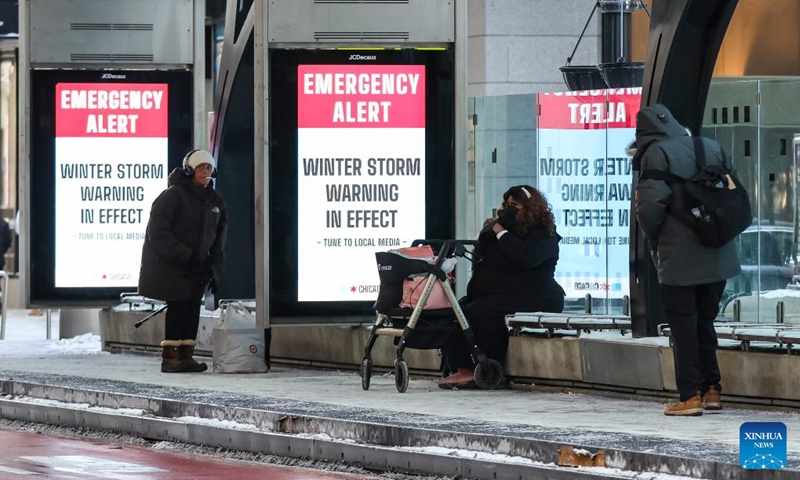When a powerful and deadly storm swept North America, blacking out cities and freezing Christmas enthusiasm, Europe is engulfed by strikes due to skyrocketing prices as well as more crises including hate crimes and unemployment.
The West is set to conclude 2022 and greet 2023 in a gloomy atmosphere with much immediate chaos, while chronic pains of social division, racism, and ineffective governance can hardly see a turnaround in the near future either, observers said.
More than 1.5 million in North America spent the Christmas in blackout due to a massive winter storm which extends more than 3,200 kilometers from US’ Texas to Canada’s Quebec. Nearly 250 million Americans and Canadians were feeling the icy grip of the storm which claimed at least 37 deaths in the US, CNN reported on Sunday.
Thousands of flights have been canceled since Thursday when travels should have peaked during the Christmas holidays. Travel problems across the country were being exacerbated by a shortage of snowplough operators, with low pay rates being blamed, according to the BBC.
Yet the festive atmosphere was not only disturbed by the natural disaster. A series of deeply rooted social and governance problems appeared prominent and dampened the holiday joy.
According to US media, several busloads of migrants, including children and babies, were dropped off in front of Vice President Kamala Harris’ residence in Washington, DC, on Christmas Eve. Some of them wore T-shirts in the freezing weather.
The White House put the blame on the Texas governor Greg Abbott, calling it a “cruel, dangerous, and shameful stunt.” Abbott is one of at least three Republican governors who have taken credit for busing or flying migrants north to protest the Biden administration’s immigration policies.
Analysts noted the Republicans are criticized of staging public displays to proclaim themselves the biggest champion of border security while Democrats have seemed to refuse to acknowledge there is a crisis at the border.
The dysfunctional US border policy is a headache, but it is just a symptom of a lingering deep illness – the US’ failure in problem solving and governance, Li Haidong, a professor at the Institute of International Relations at the China Foreign Affairs University, told the Global Times on Monday. Li cited the gun violence as another salient governance problem.
The US had recorded more than 600 mass shootings in 2022, a new high when the pandemic already drove up gun violence, according to Gun Violence Archive, a nonprofit organization that tracks shootings in the US. A latest study found in some parts of the US, young men face a higher risk of dying from gun violence than if they’d gone to war in Afghanistan and Iraq.
The separation of powers between states and the federal government, the political battles between the two parties at all levels make gun violence often discussed but never addressed, Wei Nanzhi, a research fellow with the Institute of American Studies at the Chinese Academy of Social Sciences in Beijing, told the Global Times on Monday.
Polarized US politics have paralyzed its systemic capability to reach consensus on key issues and solve real problems, be it gun violence, immigration or racism, analysts said.
The US has set a bad example for its neighbor in the north. Though firearms-related crimes account for less than 3 percent of all violence in Canada, since 2009, the per capita rate of guns being fired with intent to kill or wound has increased fivefold, Reuters reported after a shooting in Toronto killed 5 and wounded another on December 18.
Woes across Atlantic
On the other side of the Atlantic, Europeans are struggling with their own problems of inflation, skyrocketing energy prices, industrial drainage, unemployment, and dangerous rise of populism and extremism.
On Friday, a gunman opened fire in central Paris, killing three and wounding three others. The 69-year-old attacker targeted a Kurdish cultural center and attributed his act to his “being racist,” France 24 reported.
The shooting stirred up concerns about hate crimes at a time when far-right voices have gained prominence in France and around Europe in recent years, France24 reported.
Several hundred Kurds gathered on Friday in protest at the shootings, clashing at times violently with security forces, throwing rocks and setting fire to rubbish bins. Police responded with tear gas and 11 officers were wounded, police said.
Across the English Channel, the UK was busy dealing with its fresh series of strikes amid the Christmas holidays.
Railway workers have brought the transport network to a standstill and Border Force staff are preparing to walk out. Nurses and paramedics, postal workers, bus drivers and civil servants are either in the middle of strike action or threatening to strike, according to Financial Times.
A collection of individual disputes across various sectors have coalesced into a broader sense that something has gone very wrong in Britain, with workers saying that their pay, conditions and ability to provide essential services have been compromised by years of cuts and underinvestment, Financial Times reported, citing union representative who warned of further escalation in January.
Zhao Junjie, a research fellow at the Chinese Academy of Social Sciences’ Institute of European Studies, told the Global Times on Monday that chaos on the surface reflect deep-rooted socioeconomic problems in Europe, resulting from internal and external factors.
Internally, politicians don’t represent the public’s interests but have become spokespeople for the elites; people’s anger gives rise to right-wing parties, populism and extremism. The whirlwind of power changes in some countries also makes policies unsustainable, Zhao explained.
Externally, Zhao noted that the Russia-Ukraine conflict is a major factor, which not only drained European economy but also narrowed its room to seek political autonomy.
Europe, gripped by an energy crisis, is in a power-saving mode. Europeans switched off decoration lights and shortened Christmas markets this winter to cut energy usage. People are scrambling to install solar panels on their houses and buying extra duvets and heaters to cope with lives without central heating.
Fuel poverty has not only left Europeans in harsh coldness, but also tied Europe closer to its alternative energy supplier — the US, Zhao said. “When more resources and fiscal budgets are allocated in line with what the US wants (the Europe to do), less can be invested into industries and public livelihoods.”
Li Haidong said the easement of inflation largely depends on restoration of global supply chain and adjustment in energy structure, which cannot see a quick improvement in 2023. Neither can the chronic social and governance problems be alleviated.
“2023 won’t be easy for both sides of the Atlantic.”













